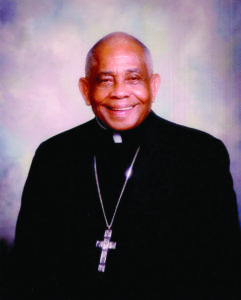By Terrance P. Dickson (CNS)
BILOXI – Bishop Joseph Lawson Howze, the founding bishop of the Diocese of Biloxi and the first black bishop in the 20th century to head a U.S. diocese, was laid to rest Wednesday, Jan. 16. He died Jan. 9 at the age of 95.

Bishop Howze
Eight bishops, including Bishop Joseph Kopacz of the Diocese of Jackson, presided at this funeral along with another 50 priests and about as many family members. Archbishop Thomas Rodi, of the Archdiocese of Mobile, presided.
“While we are saddened by the death of Bishop Joseph Lawson Howze, we rejoice in his life,” said Bishop Louis F. Kihneman III of Biloxi. “His was a life well lived in faithful service to almighty God and to the people of Mississippi, both as an auxiliary bishop of the Diocese of Natchez-Jackson and later as first bishop of Biloxi from 1977 to 2001.”
Noting that establishing a new diocese was difficult work, Bishop Kihneman said Bishop Howze was “very proud of what he, with the help of devoted clergy, religious and laity, accomplished during his tenure” and was “forever grateful to the people of the diocese for their unfailing generosity of time, talent and treasure.”
Bishop Kopacz commented on Bishop Howze’s legacy as a leader and evangelizer in the black Catholic community locally and nationally.
Despite deteriorating health in recent years, Bishop Howze remained interested in events in the diocese, Bishop Kihneman said.
“He loved the Diocese of Biloxi and prayed unceasingly for its continued success. He had a genuine concern for the salvation of souls,” he added.
Joseph Lawson Howze was born in Daphne, Alabama, Aug. 30, 1923, to Albert Otis Howze Sr. and Helen (Lawson) Howze. He began his school years at Most Pure Heart of Mary School in Mobile, Alabama, but his first year of school was interrupted in 1928 by the death of his mother, just six days after she bore her fourth child. The eldest, then age 5, young Lawson (Joseph is his baptismal name) was shuttled back and forth between the homes of his grandparents, aunts and father, who later remarried and fathered three more children.
After graduating as valedictorian of his 1944 high school class, a young Lawson Howze graduated with honors and as president of the senior class from Alabama State College. He had intended to study medicine, but instead earned a bachelor’s degree in science and education and began teaching biology and chemistry at Central High School in Mobile.
Bishop Howze first had been a Baptist, then a Methodist, serving as a choir director and church organist and pianist. But while teaching at Central High School he was drawn to the Catholic faith through the example of Marion Carroll Jr., one of seven Catholic students in his biology class. Soon he began instruction in the Catholic faith under the direction of Josephite Father Benjamin Horton.
At age 25 on Dec. 4, 1948, he was baptized a Catholic at Most Pure Heart of Mary Church in Mobile. An interest in the priesthood soon developed. After inquiring about becoming a priest with Bishop Vincent S. Waters of Raleigh, North Carolina, he later was adopted as a student for the diocese and began studies at the Diocesan Preparatory Seminary in Buffalo, New York.
The young Howze became the first black priest ordained in North Carolina, when he was welcomed to the priesthood in 1959 in the Diocese of Raleigh. He subsequently celebrated his first Mass at the parish in Mobile where he was baptized. He served as pastor of several parishes in North Carolina during his 13 years of ministry there.
In November 1972, St. Paul VI appoint Father Howze as auxiliary bishop of the Diocese of Natchez-Jackson, Mississippi. His episcopal ordination followed on Jan. 28, 1973, in Jackson.
Within a year, Bishop Howze accepted the presidency of the National Black Catholic Clergy Caucus.
On March 8, 1977, Bishop Howze was appointed as the first bishop of the newly established Diocese of Biloxi.
Bishop Joseph Latino, bishop emeritus of the Diocese of Jackson, sent his condolences to the church in Biloxi. “From being a convert to Catholicism and then following His Lord’s call to the priesthood, Bishop Howze was fully enveloped in his Christian faith. With his appointment as auxiliary bishop of the then Diocese of Natchez-Jackson and subsequent historic appointment as the first Bishop of Biloxi, he ministered through good times and challenges with the steady hand and heart of a devoted shepherd,” said Bishop Latino.
During his leadership of the Biloxi Diocese, Bishop Howze served on several U.S. bishops’ committees focusing on justice, peace, interreligious and ecumenical affairs, and black Catholic ministry.
Bishop Howze held several honorary degrees and was a member of the Knights of Peter Claver and the Knights of Columbus.
He retired May 15, 2001, after serving the Biloxi Diocese for 24 years.
After his funeral, a horse-drawn carriage took him to the newly-esablished prayer garden for bishops behind the Nativity of the Blessed Virgin Mary Cathedral.
(Dickson is editor of Gulf Pine Catholic, newspaper of the Diocese of Biloxi. Maureen Smith contributed to this report.)
